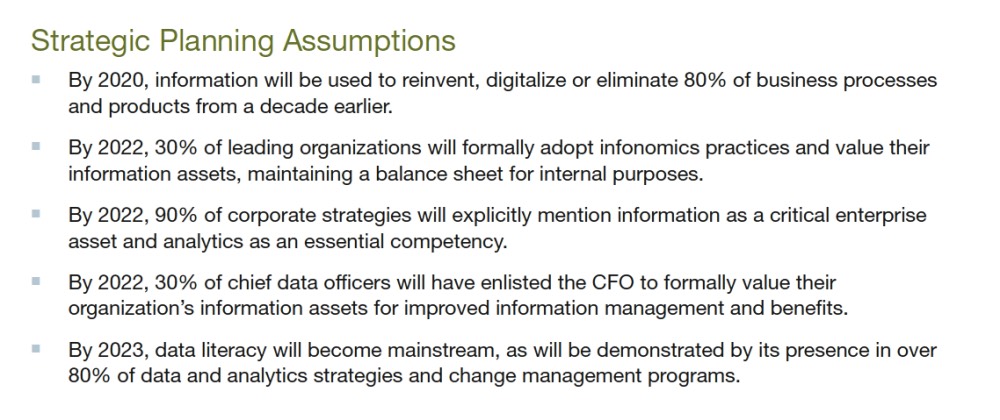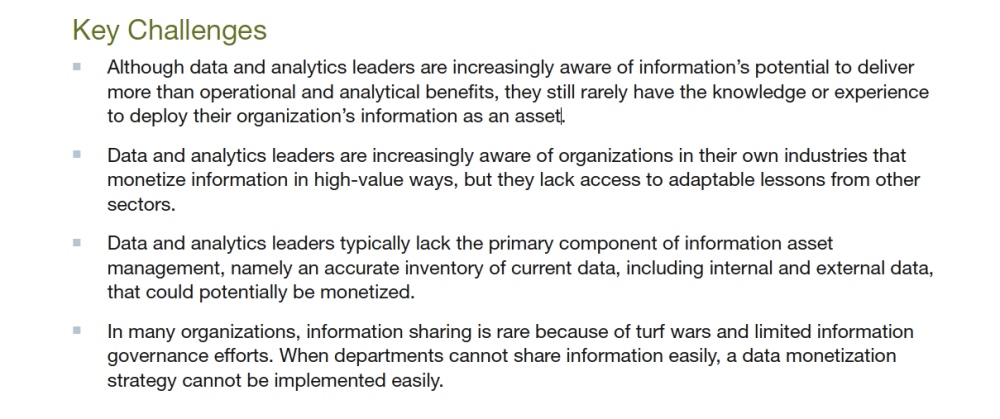Data and analytics leaders have accepted that data, if harnessed properly, can add tremendous value to business through the rich insights that it provides. And this can go beyond decision making and operational excellence. Taking a disciplined approach to data and analytics strategies will enable them to accelerate monetization of their information assets. Yet they rarely have the knowledge or experience to deploy their organisation’s information as an asset.
Ted Friedman, Distinguished VP Analyst, Gartner has interacted with several organisations and observes that data analytics leaders and Chief Data Officers are not directly measuring the financial value of data & analytics. He says that the value of data could be included in the valuation of the company in future. He also talks about the models that Gartner offers to help organisations assess the economic value of their data.
Here are excerpts from the interview:
DC: What must business leaders do to create a data-driven business?
TF: Gartner has long advocated Data Literacy. In my view, the most significant thing that a business leader or a Chief Data Officer (CDO) can do is to increase the level of data literacy. The first thing to do is to educate people at all levels in the organisation that data is an asset and that it has value. Data can help people be more effective in their role. On the data literacy point, we are seeing organisations begin to do this. They conduct training programs for their people about data as an asset; they are doing constant communications and marketing in the form of Intranet communications or training workshops. I know of some companies that build data literacy training into their new employee on-boarding process.

Source: Gartner – Applied Infonomics: Seven Steps to Monetize Available Information Assets
DC: What is the value given to data today? How does one assess the economic value of data? What kind of models exist to do this?
TF: There’s a lot of interest about data assets being tracked on the balance sheets of corporations, even though, there is not a country in the world that has a law that mandates that. But CEOs, CDOs and CFOs are starting to ask about that. They ask about ways in which they can assess the value.
At Gartner, we have a set of models that we offer to our clients on how they can stress the economic value of their data. It is a topic of research we call ‘Infonomics’. There are six models that we talk about for Infonomics — six ways in which organisations can assess the economic value of their data. It ranges from more financially oriented models to things that are quite specific around data, like assessing the potential value of monetisation of that data, or assessing the degree to which it contributes value to critical business processes.
You need some methodology and you must begin to look at your landscape of data assets, assess the value of them, and then prioritise your work on them, commensurate with the value.

Source: Gartner – Applied Infonomics: Seven Steps to Monetize Available Information Assets
DC: In Gartner’s fourth annual CDO survey, there is a finding that only 8% of CDOs are directly measuring the financial value of DA. 29% tie it to the business KPIs. Why are these numbers so low?
TF: I think one of the reasons why the number is low is that it is hard to do that. A big company with lots of data assets and a lot of complexity — it is just so hard to assess the value in a vigorous and detailed way. I also think that some pockets of the organisation do this well, while other pockets don’t. So there isn’t a high degree of consistency that is required to truly measure this.
I spend a lot of time talking to data analytics leaders and I find that a lot of the time they don’t have the right scope in place. They are aiming their efforts at parts of the business or slices of the data. They are trying to do too much. And the tool they are using allows them to analyse at a very thin or lightweight level. I feel the scope is set in the wrong way and that prevents these organisations from doing the deeper analysis to truly understand what is the value.
I also think this all moves very slowly inside big companies, which contrasts with the speed at which things move in the IT industry.
I think 8% is a positive because a couple of years ago that number was close to zero. But the progression is now starting and I like to think that it is going to accelerate.
As more CEOs and boards of directors get interested in the idea of data monetisation, and the concept of data as an asset, I expect that number to accelerate a lot over the next couple of years.
RELATED STORY: Chief Data Officers are a growing tribe, but higher strategic focus is required: Gartner survey
DC: There is a lot of speculation about whether data should be considered in the valuation of a company. It is not legally binding right now. Given that data has so much relevance, do you think it might be considered as an asset in the future?
TF: I spoke to several companies about this and some told me they did an acquisition predicated on the belief that the data they were getting in the acquisition held a certain amount of value, but they didn’t do the right things to measure that. Post the acquisition they found out that it wasn’t what they expected, and they believed they overpaid for the acquisition.
Another company I spoke to bought a competitor on the idea that they were going to get new customers from the deal. They believed that because they had looked at the customer database of the entity they were acquiring. Post the acquisition they started to integrate the systems and the data of the acquired entity and they found that they were misled. They were expecting X number of new customers but the actual result was half of that.
So now people are looking at the data as part of the due diligence, assessing the value of the data, just the way they would assess the people, skills, the physical property, the intellectual property.
So it would be a prerequisite for companies to track the value of the data like any other asset. It should begin with this.
Measuring the value of the data is a prerequisite for companies to be successful.










